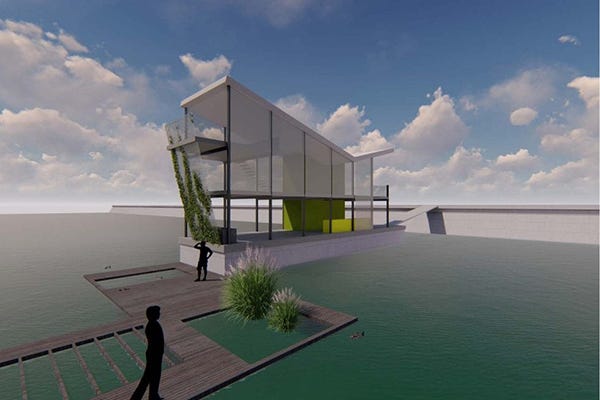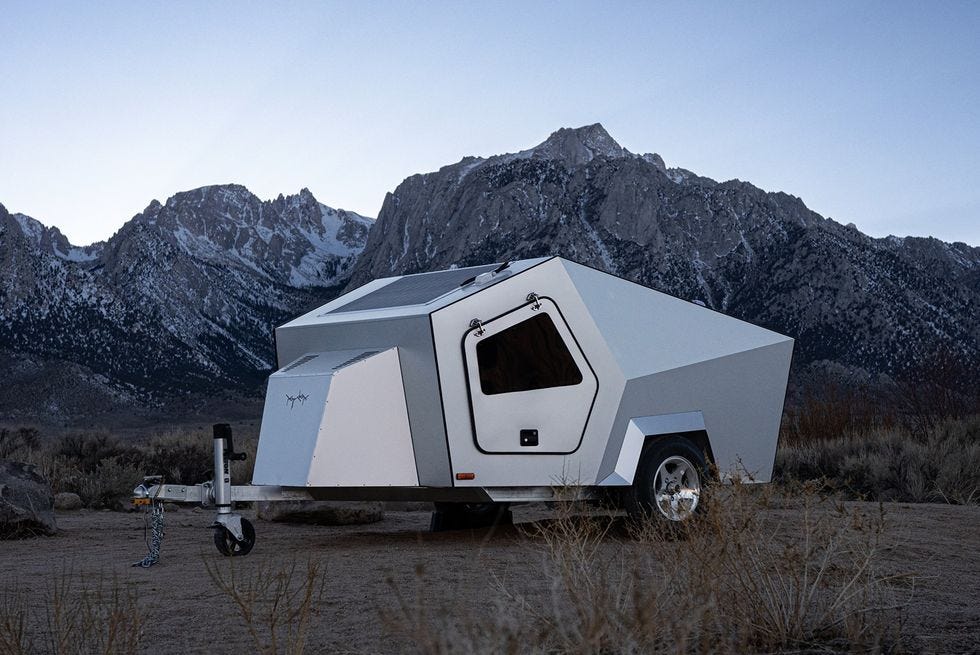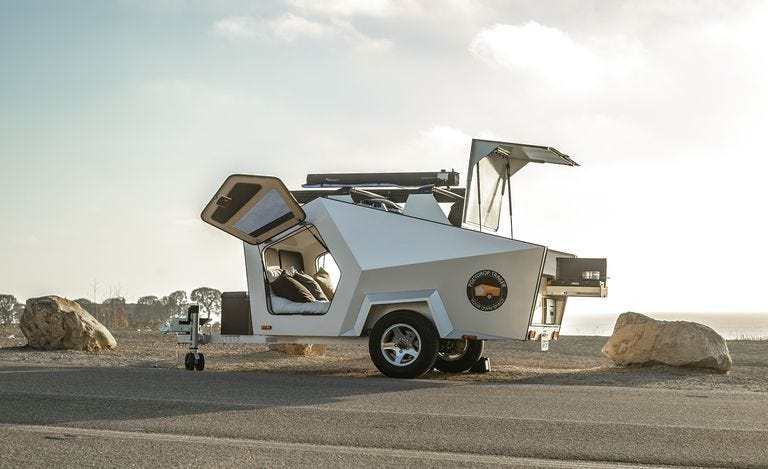The Sunday Read
Van life, tiny homes, and more
Off-grid, on the water
A rendering of an off-grid, floating building.
Off-grid, floating buildings designed to withstand severe storms from climate change could be a thing soon.
Dorit Aviv, an Assistant Professor of Architecture at the Weitzman School of Design, specializing in energy and ecology, is working on creating such a structure in Red Hook’s Gowanus Bay.
As Aviv notes in a blog post, “Waterfront communities are the most susceptible to climate change and to extreme weather events. Beyond the risk of flooding itself, centralized water and energy systems are prone to failure under dynamic storm conditions; the connectivity of sewage and water supply in waterfront neighborhoods is often compromised during storms.”
Dorit Aviv.
Aviv’s design calls for a sophisticated floating structure that would incorporate passive design, solar panels, and potentially small wind turbines and tidal power technology, among other advanced ideas.
You ready to tow your tiny house in an armoured vehicle?
Tiny home owner? Here’s the armoured vehicle you need to tow your place around
I’ve been everywhere, man. Those are the immortal words of Hank Snow.
Soon, entrepreneur Elon Musk may make that a reality for many people.
Musk has a huge vision for the future: Tesla electric vehicles; space launches to Mars; rural internet provided through his Starlink satellite service.
And then there’s Cybertruck That’s Musk’s crazy armoured EV set for production later this year, and which the website Interesting Engineering suggests could be used to pull and power tiny homes.
“In a concise response on Twitter, Elon Musk responded with a resounding "Yes" to a post asking whether or not someone would be able to plug their tiny house into a Cybertruck to power it,” according to the story in Interesting Engineering.
Whether or not off-grid, tiny home living anywhere will be a thing remains to be seen, but it’s certainly an idea with promise at this point, although the Cybertruck may be a case of overkill.
Tesla Canada points out the vehicle is “built with an exterior shell made for ultimate durability and passenger protection. Starting with a nearly impenetrable exoskeleton, every component is designed for superior strength and endurance, from Ultra-Hard 30X Cold-Rolled stainless-steel structural skin to Tesla armor glass.”
Sure, it’s all about the safety, but the vehicle does sound like something that could be deployed in a war zone if necessary.
You were looking for an expensive trailer to go with that armoured vehicle, weren’t you?
Just the the thing to tow behind your Cybertruck: A Polydrops P17A trailer.
But why just tow a tiny home behind your Cybertruck? Why not get a Polydrops P17A trailer?
That is your tiny home. The P17A comes with 260W solar panels and batteries “able to power all components including a 5000-BTU air conditioner, heater, fridge, induction cooktop for more than six nights."
Car and Driver reports that the trailer features a “lightweight aluminum frame and an exterior with an anodized aluminum finish. The cozy baltic birch interior is large enough to fit a full-size mattress and a micro closet in the back. “
The trailer looks a bit like a Mars explorer.
The basic model is yours for the bargain price of $24,990. Of course, you’ll want to upgrade and get the kitchenette module ($1850) and a built-in bluetooth speaker ($500).
Or maybe not.
As The Flying Lizards sang way back when, it’s only money
Meet the U.K. folks living their best lives - in vans
The Country Times writes about the people in its area opting for van lives. Adam Butterworth, who for example “works for an aeronautical design consultancy and volunteers at the RNLI, decided to live in a van after falling foul of an unscrupulous landlord.”
The 26-year-old said he was spending nearly half of his wages “to rent a one room studio flat that was filled with damp and causing me respiratory problems.”
Butterworth told the paper: “A van is the most attractive alternative to haemorrhaging money on negligent landlords that couldn’t care less.”
Laura Bates, 25, explained that trying to rent while saving for a mortgage and still having a life wasn’t working out. She saw van life as a way to “declutter and simplify her life.”
As a single woman, Bates added: “there were safety concerns. Alongside more conventional measures such as double locks, she intended to hang men’s boxers on her washing line and put old boots at the entrance of the vehicle, “so that people think I am not alone.
“But it is quite safe, you’ve just got to get over the first couple of weeks.”






As usual a wonderful and diverse read!
Interesting facts and then the insight of the "apocalyptic" way of transportation Mr. Musk is planning for us, well, that's certainly something different.